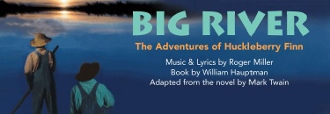BIG RIVER MAKES A CLASSIC BOOK FLOW BEAUTIFULLY ONTO THE STAGE
In Big River, adapted from the novel The Adventures of Huckleberry Finn, the “mighty Mississippi” gracefully becomes a mighty metaphor for a journey of discovery into human foibles, adventure, the meaning of friendship, prejudice, redemption, and right and wrong. More than that, decked in rollicking wit and biting social commentary such as only Mark Twain could conceive, draped in catchy music by immortal songwriter Roger Miller (a surprise to me but what a perfect choice), and delivered by rich, emotive voices, it all adds up to a stunning, totally satisfying experience at TheatreWorks.
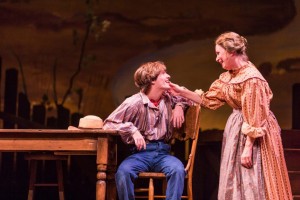 Published in 1885 and required reading for almost every modern high-schooler, this novel was banned by libraries and beleaguered with controversies around its use of the “n-word.” But it never went out of print, which I always saw as a triumph for both the novel and the African-American race; you can’t blot out history, you can’t pretend it never happened, but you can acknowledge the past and build more respectful rapport between races in the present to make sure history doesn’t repeat itself. Big River, which opened on Broadway 100 years after the novel’s publication, does just that with aplomb, humor, amazing stagecraft and heart’”all the while reveling in the human capacity to bond.
Published in 1885 and required reading for almost every modern high-schooler, this novel was banned by libraries and beleaguered with controversies around its use of the “n-word.” But it never went out of print, which I always saw as a triumph for both the novel and the African-American race; you can’t blot out history, you can’t pretend it never happened, but you can acknowledge the past and build more respectful rapport between races in the present to make sure history doesn’t repeat itself. Big River, which opened on Broadway 100 years after the novel’s publication, does just that with aplomb, humor, amazing stagecraft and heart’”all the while reveling in the human capacity to bond.
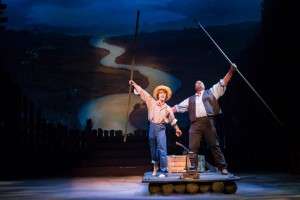 You can’t help but be caught up immediately by Joe Ragey’s rustic set that uses every available dimension of space, from the sweeping stage to the walls on either side, the panoramic backdrop of the mighty river stretches away beguilingly behind and beyond the stage. A folksy tone that put us all at Twain’s disposal is set immediately with a guitar-playing cowboy peeking from a balcony high up at stage left. This delightful opening is followed by three hours that are true to the author: lively and astonishing adventure, lighthearted to caustic wit, heart-wrenching scenes lifted from the realities of slavery, and moments from the irreverent to the deeply spiritual. It’s a long play – but I’d advise anyone from eager history buffs to Americana fans to stick with it and enjoy the ride through territory packed with plenty of diversion.
You can’t help but be caught up immediately by Joe Ragey’s rustic set that uses every available dimension of space, from the sweeping stage to the walls on either side, the panoramic backdrop of the mighty river stretches away beguilingly behind and beyond the stage. A folksy tone that put us all at Twain’s disposal is set immediately with a guitar-playing cowboy peeking from a balcony high up at stage left. This delightful opening is followed by three hours that are true to the author: lively and astonishing adventure, lighthearted to caustic wit, heart-wrenching scenes lifted from the realities of slavery, and moments from the irreverent to the deeply spiritual. It’s a long play – but I’d advise anyone from eager history buffs to Americana fans to stick with it and enjoy the ride through territory packed with plenty of diversion.
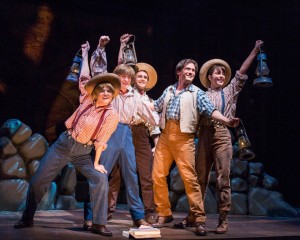 First, Huck (Alex Goley) suffers under the well-meaning proselytizing of the Widow Douglas (Lucinda Hitchcock Cone) and Miss Watson (Alison Ewing)’”“Do You Wanna Go to Heaven?” is my idea of fun for any convent-school survivor. With his soaring tenor, boyish looks, devilish sparkle and costume designer B. Modern’s homespun-looking togs, I found Goley to be the perfect Huck, overflowing with youthful spirits and finding his way in life. Then comes an interlude with Tom Sawyer’s (Scott Reardon) lawless gang, and Huck being snatched away by his drink-sodden father Pap (an almost morbidly fascinating Gary S. Martinez), after which Huck has to fake his own death to escape.
First, Huck (Alex Goley) suffers under the well-meaning proselytizing of the Widow Douglas (Lucinda Hitchcock Cone) and Miss Watson (Alison Ewing)’”“Do You Wanna Go to Heaven?” is my idea of fun for any convent-school survivor. With his soaring tenor, boyish looks, devilish sparkle and costume designer B. Modern’s homespun-looking togs, I found Goley to be the perfect Huck, overflowing with youthful spirits and finding his way in life. Then comes an interlude with Tom Sawyer’s (Scott Reardon) lawless gang, and Huck being snatched away by his drink-sodden father Pap (an almost morbidly fascinating Gary S. Martinez), after which Huck has to fake his own death to escape.
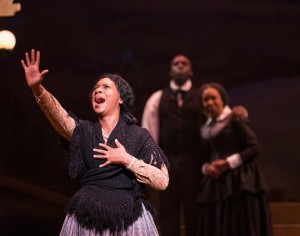 Enter runaway slave Jim (James Monroe Inglehart, fresh from three years working on Broadway), and the two set off by raft down the Mississippi, heading for the North where Jim can work to earn money to buy his family freedom. Inglehart’s Jim has just the right dose of sober, sincere, and focused balance to Huck and Tom’s hijinks. With his resounding baritone, Inglehart also leads right into the heart of the slave experience: His rendition of “Worlds Apart,” plainly showing how, under the skin, more binds us than divides us, caused the house to erupt in a richly deserved ovation on opening night.
Enter runaway slave Jim (James Monroe Inglehart, fresh from three years working on Broadway), and the two set off by raft down the Mississippi, heading for the North where Jim can work to earn money to buy his family freedom. Inglehart’s Jim has just the right dose of sober, sincere, and focused balance to Huck and Tom’s hijinks. With his resounding baritone, Inglehart also leads right into the heart of the slave experience: His rendition of “Worlds Apart,” plainly showing how, under the skin, more binds us than divides us, caused the house to erupt in a richly deserved ovation on opening night.
All the scenes on the raft were astounding, thanks again to Scenic Designer Ragey, whose high-tech raft skimmed realistically about the stage at just the right angle to the river backdrop. It appeared to be careening down the water, a visual effect I particularly enjoyed.
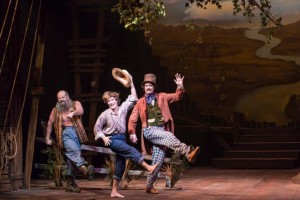 Huck’s story continues with zestfully colorful characters, and this cast’s topnotch actors brought them to unforgettable life. Fast-talking con men “the King” (Martin Rojas Dietrich) and “the Duke” (Jackson Davis) are deliciously, almost frighteningly slimy. (Davis shines when at one point the lighthearted tables turn and a gang who’d been duped tars and feathers the sham Duke.) Scenes with African American women in shapeless dresses and headrags, as runaway slaves loaded onto boats and guarded by rifle-toting slave catchers, singing haunting and mournful spirituals, I found unforgettable. The young Wilkes sisters, particularly Mary Jane (Katie Jane Martin) to whom Huck loses his heart, strike just the right note when they are duped by the King and the Duke, and Dawn L. Troupe and Tracy Camp as a slave mother and daughter sold away from each other, heartrendingly capture the horrors of slavery.
Huck’s story continues with zestfully colorful characters, and this cast’s topnotch actors brought them to unforgettable life. Fast-talking con men “the King” (Martin Rojas Dietrich) and “the Duke” (Jackson Davis) are deliciously, almost frighteningly slimy. (Davis shines when at one point the lighthearted tables turn and a gang who’d been duped tars and feathers the sham Duke.) Scenes with African American women in shapeless dresses and headrags, as runaway slaves loaded onto boats and guarded by rifle-toting slave catchers, singing haunting and mournful spirituals, I found unforgettable. The young Wilkes sisters, particularly Mary Jane (Katie Jane Martin) to whom Huck loses his heart, strike just the right note when they are duped by the King and the Duke, and Dawn L. Troupe and Tracy Camp as a slave mother and daughter sold away from each other, heartrendingly capture the horrors of slavery.
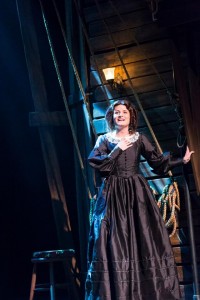 Director Robert Kelley gives this pairing of Twain’s classic and prescient story with Miller’s just-right score, more than its ample due, as the cast brings that place and the times, a picture of an adventuresome boy learning from the experiences of others what is wrong and right in the world, to what I’d call very rich life, while beautifully capturing Twain’s pervasive social commentary and messages of human justice.
Director Robert Kelley gives this pairing of Twain’s classic and prescient story with Miller’s just-right score, more than its ample due, as the cast brings that place and the times, a picture of an adventuresome boy learning from the experiences of others what is wrong and right in the world, to what I’d call very rich life, while beautifully capturing Twain’s pervasive social commentary and messages of human justice.
Twain himself could hardly have foreseen his works and clear-eyed commentary immortalized in a seven-time Tony Award-winning musical, but it’s not too big a stretch to think he would have approved.
photos by Mark Kitaoka
Big River
TheatreWorks at Lucie Stern Theatre in Palo Alto
scheduled to end on Dec. 30, 2012
for tickets, call (650) 463-1960 or visit http://www.theatreworks.org
